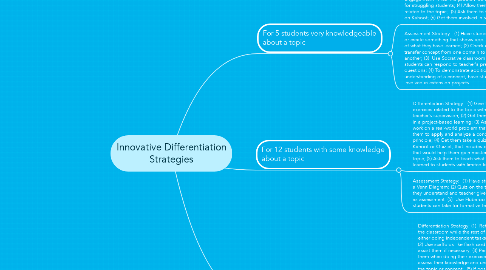Innovative Differentiation Strategies
by Edna Salayog

1. For 5 students very knowledgeable about a topic
1.1. Differentiation Strategy: (1) Give students open-ended questions; (2) Engage them in real-life problem solving; (3) Ask them to serve as tutors for struggling students; (4) Allow them to engage in independent project related to the topic; (5) Ask them to work on relatively difficult questions on Kahoot; (6) Get them involved in solving adult-size problems.
1.2. Assessment Strategy: (1) Have students build or create something that shows application of of what they have learned; (2) Check ability to transfer concept from one domain to another; (3) Use Socrative classroom where students can respond to teacher's pre-posted questions; (4) To demonstrate additional understanding of a concept, have students involved in extension projects.
2. For 12 students with some knowledge about a topic
2.1. Differentiation Strategy: (1) Give them more exercises related to the topic with the teacher's supervision; (2) Get them involved in a project-based learning; (3) Ask them to work on a real-world problem that allows them to apply and analyze a concept or principle; (4) Get them take a quiz, using Kahoot or Quizlet, that includes questions that would help them gain mastery of the topic; (5) Ask them to teach what they have learned to students with limited knowledge.
2.2. Assessment Strategy: (1) Have students compare and contrast a topic using a Venn Diagram; (2) Quiz on the topic; (3) Have students write down what they understand and teacher give feedback on explanation; (4) Use exit slips as assessment; (5) Use Flubaroo script to create self-marking quizzes that students can take for formative feedback on their understanding.
3. For 5 students with limited knowledge about a topic
3.1. Differentiation Strategy: (1) Reteach students in the classroom while the rest of the class are either doing independent tasks or group tasks; (2) Use scaffolds like flash card or handouts to assist them if necessary; (3) Personally assist them when doing their exercises; (4) Constantly assess their knowledge and understanding of the topic or concept; (5) If possible, tutor them about the next lesson that they can be more confident on the next class;
3.2. Assessment Strategy: (1) Use a service like Socrative teacher or Google Docs and ask questions during class and have students respond to questions individually or in groups; (2) Use Kahoot or Quizlet to assess what they have learned; (3) Use a Yes/No card to check for understanding; (4) Use exit slips; (5) Using Google Forms have students write comments, suggestions, questions about the lesson.


